Censorship and the Collapse of the Soviet Union
Frank Ellis, American Renaissance, January 23, 2021
Editor’s note: This essay is adapted from a considerably longer original version, which can be found here.
Every function discharged by a state in whatever form it exists — liberal-democratic, corporatist, authoritarian, or totalitarian — requires vast amounts of information. Some areas, economic and military matters, for example, are more dependent on such raw material than others but the basic point remains that a state in any form cannot discharge even minimal levels of statecraft without access to timely and accurate information. The trend to ever greater complexity — a hallmark of the modern state — generates more information and data, which in turn must be processed, stored, protected from unauthorized access, retrieved, and analyzed. Western states may well be moving to a situation in which the volume, diversity, and complexity of information will overwhelm the ability of human agents to make rational decisions.
The trend towards efficient information management did not start with the rise of IBM or the arrival of desktop personal computers in the 1980s. There were high levels of information complexity and data requiring efficient processing even in the 19th century. Thus, in 1917, when Lenin and his revolutionaries seized power, they were confronted with the problems of running a state that over the previous four decades had experienced rapid industrialization. Their solutions to state management were ideologically justified violence and the creation of a massive censorship apparatus. Intended to protect the new Soviet state, this censorship apparatus actually worked against the state, stifling innovation and the exchange of ideas and information and can be considered to be the main factor in bringing about the final Soviet collapse in 1991. Three decades later, a relevant question is whether the widespread censorship in the public and private sphere in America, primarily in matters of race, feminism, and multiculturalism will prove to be as destructive to the survival of the American Republic, as Marxist-Leninist-Stalinist censorship was to the Soviet state.
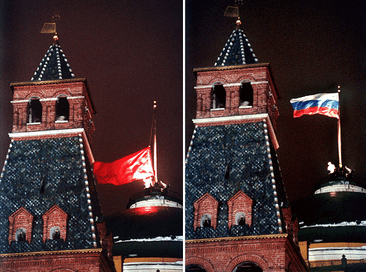
The Soviet flag being lowered from the Moscow Kremlin and replaced with the flag of Russia on December 25, 1991. (Credit Image: Wikipedia)
All living things seek out survival-critical information about their environment. This is infotropism. With his large brain, the bipedal ape, Homo sapiens sapiens, demonstrates the highest degree of infotropism among all living creatures on Earth. He is driven to understand his origins and recorded history, seeing in the latter the vague and inchoate possibilities of his future. His drive to know is relentless and unstoppable: It is his defining feature.
Two reactions to infotropism are the creation of information deficit and active corruption of information. The first arises when power structures contrive to deny information to societies or to prohibit the flow of ideas. This is the behavior most commonly associated with censorship, though, in well defined situations access to information vital to state security and defense is strictly and properly controlled. In order to bring about certain outcomes desired by the state it is not enough to deny information and restrict its flow. An understanding or narrative of the world that is based not on empirically reliable and verifiable information — because the state withholds the information or will not allow it to be made available — has to be constructed to fill the void. This leads to information corruption (fake news is a variation on this process). For example, the Soviet state explained away food shortages and lack of consumer goods as due to saboteurs and wreckers: Naturally it had nothing to do with the appalling inefficiency of state ownership of the means of production. In 21st century America, it is official state policy to claim that race and sex differences are socially and politically constructed and to deny any connection between low mean black IQ and educational failure and high levels of crime. Black educational failure, it is maintained, can be due only to racism and the consequences of “whiteness” and “white privilege.” Any other publicly expressed explanation is political and social death.
The more complex a society becomes, the more information it generates and the more vital this information becomes not just in the discharge of the practical affairs of state but also in the exercise of power whether pursued for religious, political or, eventually, in the 20th century, for ideological reasons. The exercise of power based on a particular religious or a political doctrine must offer a coherent explanation of the world in order to justify its claims to pre-eminent status. At the very least, a majority of people must be persuaded to suspend disbelief. From these claims arise the conflicts in man’s affairs: between rulers and ruled, and the struggle between the defenders of any orthodoxy and dissenters and heretics. This describes the contemporary conflict between those who propagate and impose the cult of multiculturalism and those who resist it. The contestants change but it is, in essence, a familiar and ancient power struggle. Here, too, in these early struggles “free” and “speech” become conjoined to give us one of the West’s fundamental ideas: speech that is not free defines the slave.
In the USSR, Lenin had no intention of allowing unfettered discussion and dissemination of ideas among either apparent allies or opponents. Party members were required to follow the latest line on any given matter laid down by the Party (i.e. Lenin). Factionalism was a deadly sin and ideas hostile to socialism, implicit or explicit, had to be suppressed not merely because they offered a counter to the ideological worldview disseminated by the emerging Soviet agitation and propaganda apparatus but also because, according to Lenin, they were harmful and incorrect. As Valentin Turchin noted: “The chief function of the Soviet press is to ‘educate,’ not to inform. Information is allowed only to the extent that it does not interfere with the ‘educating.’”1 Politically incorrect ideas were aberrations of the mind and had to be combated in the same way a physician treated disease. Here one sees the basis of psychiatric abuse that was deployed against Soviet dissidents in the 1960s and 1970s. Historically, Lenin’s recourse to censorship was, therefore, nothing new, but its practical, ideologically-based features, its scope and depth, its destructive nature and longevity — formally abolished only as late as August 1st, 1990 — made it a unique institution in the history of ideas and the war against them. In these circumstances ad hominem attacks easily mutated to the mass physical and ideologically-justified destruction of opponents.
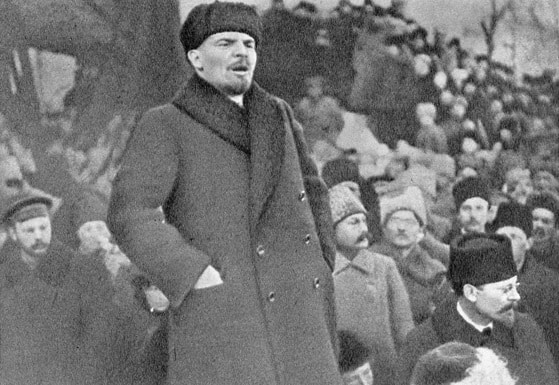
Vladimir Lenin in 1919
The other unique aspect of Soviet censorship that fully emerged only after the Soviet collapse was the damage it had inflicted. Censorship undermined the day-to-day functioning of the Soviet state. For example, the 1937 census conducted after the genocide in Ukraine and mass starvation elsewhere showed a reduction in the projected population increase by about 10-12 million (a source cited by Robert Conquest put the deficit at 15-16 million). Stalin therefore had the census-takers shot. Another census compiled by new personnel told him what he wanted to hear. Soviet-style censorship also undermined the quest for the new and undiscovered. Control of information flows, which was mandated by the need to protect the Soviet infosphere from Western ideas and reportage, effectively ruled out the widespread use of personal computers, tape cassette recorders, high-quality cameras, fax machines, camcorders, videos, photocopiers, mobile satellite television and electronic mail, thereby denying the Soviet economy the benefits of these media. By contrast, the West fully and devastatingly exploited these media in the 1980s.
Censorship was ultimately destructive of the Soviet state because it affected just about every aspect of Soviet life. More efficient methods of industrial and agricultural production were not adopted because adoption of these methods would necessarily mean that the Party would have to relinquish control over information flows. Once that happened, it would have led to an examination of the past (Lenin and Stalin) and demands for change, even from within the Party. The pervasively destructive strata of censorship that characterized the Soviet state and society and that inflicted such damage on the economy do not yet exist in America, and are unlikely in the foreseeable future. Censoring the obviously very awkward questions of low mean black IQ and crime inflicts no damage on the sectors of the economy that matter: STEM, weapons and space research, robotics and AI. As long as these areas and emerging technologies are left alone and not substantially contaminated by critical race theory — as opposed to scientists being merely irritated by it — no real harm will be done.
Interestingly, there is something of a Soviet precedent. Citing or praising Western scientists (Gregor Mendel, Norbert Wiener, Albert Einstein, William Shannon) was deemed to be kowtowing to the West and degrading to the achievements of Soviet science. But whatever Soviet propaganda campaigns said about kowtowing to Western science, dialectical materialism was not allowed to obstruct Soviet attempts to get the atomic bomb. The institute charged with the task under the supervision of Igor Kurchatov, which received a steady stream of priceless data on the progress of the Manhattan Project from Western agents of the NKGB — the decisive factor in the successful Soviet atomic bomb program — was left alone.
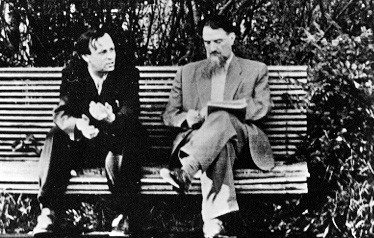
Russian physicists Andrei Sakharov (left) and Igor Kurchatov, who headed the Soviet atomic bomb project.
Today, in Silicon Valley, NASA, and in the Pentagon, whatever the public statements on “diversity,” it is also clearly understood that ICBMs, Falcon rockets, C4ISTAR and high-performance combat aircraft do not function according to the ravings of critical race theory. China’s rise to power and wealth began when Mao was shunted sideways. Mao can still be venerated as the Great Helmsman, or as a sheng ren, a “sacred man,” but China’s leaders know that in order to build supersonic missiles capable of sinking US aircraft carriers they need designers and engineers who can master the necessary mathematics and physics, not Maoist zealotry.
Affirmative action and equal opportunities programs blight American life. Once again, there is a Soviet precedent for what appears to be a uniquely self-inflicted American ill. Eager to secure the loyalty of the national minorities, the Soviet state initiated a policy of korenizatsiia (indigenization), which accorded priority to national minorities in employment and education. The main victims were Russians, who were denied posts and promotions so that incompetent and often barely literate national minorities could be hired.
Over the period from 1924 to 1932, Soviet affirmative action policies in education anticipate to an extraordinary degree what is now standard practice in American educational institutions. The most important qualification determining entry to a higher education institute was race or ethnicity, not ability. As Terry Martin notes in The Affirmative Action Empire: Nations and Nationalism in the Soviet Union, 1923-1939 (2001), “Russians interpreted korenizatsiia as a deep and undeserved status insult.” Those who objected were accused of manifesting “Great Russian chauvinism” (an early version of “white skin privilege”). Soviet affirmative action policies also prefigured the dysfunctional and unexpected outcomes that today can be observed in America: racial segregation, incompetence, and permanent racial tension that can erupt into violence on the flimsiest pretexts.
Unlike the Soviet Union, America has a strong tradition of free speech and in all kinds of ways is still the most open society in the world. Free speech in America is undeniably under attack, but it is far from defeated. It is, however, being stealthily abandoned. If too many Americans (and Britons) behave as if they are not allowed to say certain things when it is perfectly reasonable and lawful to say them, then, over time the institution of free speech will be weakened. In such circumstances, it will cease to be an essential right, recognized and valued as such, and will come to be regarded as a relic of a barbarous age whose time has passed. If a majority of Americans come to accept that, formal abolition will not be necessary since appeals to free speech will invite contempt or appeals to free speech will be merely symbolic, ceremonial vestiges of an abandoned right, and in any case, no American will by then have the intellectual and moral courage to stand up and break the power of the lie.
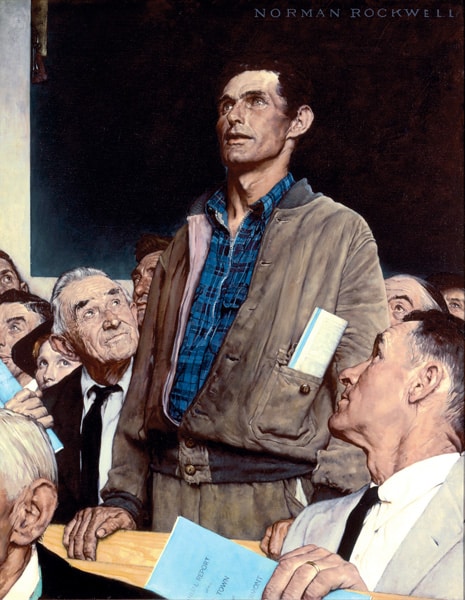
“Freedom of Speech” by Norman Rockwell
Defense of the right to state that mean black IQ is lower than mean white IQ as an exclusive free-speech right is perfectly reasonable, but runs the risk that it inadvertently invites the suspicion that the speaker is merely being deliberately provocative. Thus, the speaker is to be dismissed as an ignorant demagogue, though the fact that assertions about low mean black IQ are met with visceral hatred rater than laughter suggests that the authorities know and fear the truth. By asserting that the statement — mean black IQ is lower than white IQ — is a true statement, the speaker challenges any opponent to make the case against his claim or to concede the point. In any normally functioning university that is how the matter would be resolved.
Critically important though free speech is, the struggle to break the power exerted by multiculturalism on public life is not exclusively or essentially one of free speech. Ultimately the struggle is a matter of truth and the right — the obligation — to pursue the truth and to assert something as true. The statement that mean black IQ is lower than mean white IQ, and that evolution and genes account for most of the difference is, I assert, a true statement or much closer to the truth than competing explanations. Those who reject that assertion as false will, of course, denounce it as “racist,” which ignores the obvious question of whether it is true. If, on the other hand, they are themselves truth seekers and not truth-denying revolutionaries, they can enter the intellectual arena and demonstrate why the assertion is false. Free speech is the facilitator, the instrument by means of which one gets to the truth or something as close to it as possible.
Things are complicated by the fact that the very notion of truth is rejected. It is, apparently, a mere social and political construct. The “woking” class cannot mount a direct assault on truth so statements that enrage them are not examined on the basis that they might be true but are dismissed as “racist” and, therefore, need not be considered. The process by which the speaker in these circumstances knows that something is “racist” or “sexist” is never explained. In seeking out class enemies, the Soviet commissar and censor were guided by their infallible sense of “revolutionary justice,” whereas the woking class radical is guided by the strength of her commitment, her feelings, and her infallible sense of “social justice” in identifying “racists” and “sexists” and the hordes of prefixed “phobes.”
It is also significant that those who claim that truth is a social and political construct, thereby materially and irreversibly changing any accepted meaning and the procedure for ascertaining the truth, nevertheless retain the use of the word truth. For the sake of clarity and truthfulness, a new word embodying this radically changed concept is required. That the radical Left has not concocted a new word to replace what its ideologues consider to be the outdated “truth” when it routinely bombards the world with ever new additions to its woke vocabulary, suggests that it retains the use of the word in order to deceive the unwary, which is why university charters continue to declare a commitment to truth and academic freedom while terrorizing those who exercise their rights to academic freedom and who pursue and articulate the truth.
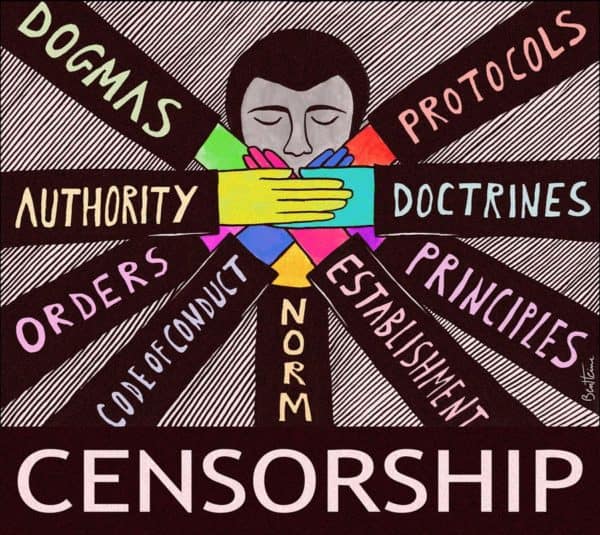
The last Soviet Constitution (1977) provides the precedent for this. Article 50 granted Soviet citizens rights to free speech and printing provided the exercise of the right was “consistent with the interests of the people and with the aims of strengthening and developing the socialist structure.” Everything is permitted provided the Party approves. Demanding, in other words, the abolition of an economic system based on the common ownership of the means of production would be anti-Soviet and counter-revolutionary. The provisions of Article 50 were reinforced by Article 62, which stipulated that a Soviet citizen “is obliged to safeguard the interests of the Soviet state, to strengthen its power and authority.” Therefore, denouncing the Soviet invasion of Afghanistan in 1979 would also make you an “enemy of the people.” This same constitution also granted constituent republics the right to secede from the Soviet Union — Article 72 — as long as the “right” was not exercised. In America today, the tacit, often explicit demand, is that the exercise of free speech “must be consistent with the interests of people of color and must strengthen and develop diversity.”
Additional consequences stem from the claim that “truth is a social and political construct.” If the factors in determining truth are social and political, as opposed to something that has to be uncovered from available data, the way is open for the ideologue to construct the truth by applying intense social and political pressure to a population: emotions, the powerful need to belong, the spurious sense of democracy, mob violence, the sense of being part of an elite vanguard, and sheer feel-goodery now become the publicly approved methods to determine what constitutes truth. This is what is meant by the “social and political construction of truth.” Mass propaganda and contemporary social media can be used to generate intense emotional pressure to accept and to conform to whatever is deemed to be ideologically correct.
Socially and politically constructed statements about anything are not permanent and can be changed in an instant to suit the whims and plans of the revolutionaries. The impact on language and culture is striking: Everything is in constant flux and this lack of certainty induces disorientation and may well be a factor in what Angus Deaton has identified as “deaths of despair.” In such circumstances, in the chaos of revolutionary uncertainty, the utterances of various individuals acquire the status of holy writ. Further, if the truth about anything is constructed according to ideological exigencies and not something to be discovered, then the ideologue in search of a better world can build the future on the basis of his blueprint, regardless of any objective physical limitations or obstacles. The outcome of the 1937 census displeased Stalin, so he took appropriate measures to rectify the egregious errors of the census takers. In such a way, the Dear Leader, Ideologue Supreme, creates the future in an act of titanic will.
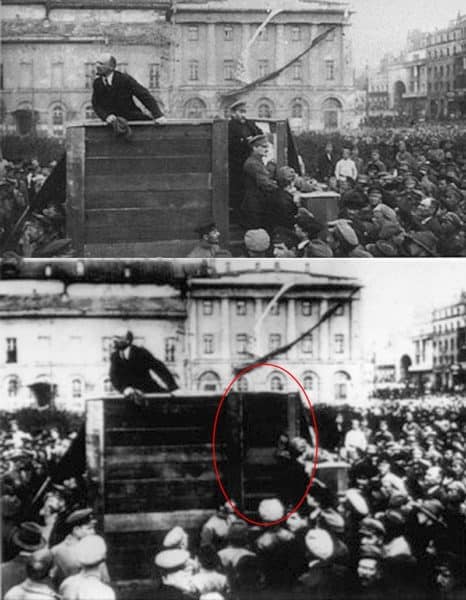
Vladimir Lenin gave a famous speech to a crowd of Soviet troops in Sverdlov Square, Moscow, in 1919. In the foreground was Leon Trotsky and Lev Kamenev. During Joseph Stalin’s government, the photograph was edited to remove his former rivals.
Truth is not a luxury or the exclusive preserve of philosophers: It is critical to survival. Our ancestors who ignored the danger posed by the saber-toothed tiger, believing that it was a harmless, misunderstood herbivore that just needed a loving hug, would not have survived very long. In view of the fact that being able to distinguish between “false”/“probably false” and “true”/“probably true” is so survival-critical that there will be a strong genetic basis for being able to differentiate between “true” and “false.” Greater social complexity and knowledge about the environment also require higher orders of abstract thinking in order, among other things, to separate “true” from “false,” with or without the corrupting effects of theocracy, Marxism-Leninism, political correctness, and the woking classes. If, in fitness terms, there is a clear benefit to pursuing and knowing the truth, there will also be a clear advantage in distorting the truth, lying and deception — yet another survival-critical reason why the ability to discriminate between “false” and “true” is so important.
People of average intelligence who are able to discriminate between “true” and “false” but who knowingly accept “false” as “true” in the name of some cause confirm the extraordinary power of group pressure to secure conformity. National Socialism, Maoism, and Soviet Communism, sought to achieve a unified, conformist mind. Post-Maoist, largely racially homogenous China pursues the same end, as does multiculturalism in America. Both states have systems of social credit: explicit in China, tacit in America. Social media platforms are huge enablers, bringing us ever closer to total unanimity. Claims that a better world has been built cannot be tested if there are no agreed criteria of truth. Thus, in the Soviet Union the lie had to be be upheld by permanent repression until the empire collapses under the weight of lies, and in America, multiculturalism must be maintained by permanent lies and increasing repression.
The collapse of the Soviet Union and Yugoslavia suggests that the longer oppressive censorship — and everything that accompanies and supports it — is maintained, the more destructive and unforgiving are the consequences when the truth is finally revealed, when the ruling caste loses the will to impose the lie, or when a critical mass of people refuses to live by the lie. This is the stage of penultimate collapse.
What would happen in America if there was a sudden outbreak of openness on the matter of race and sex differences, if decades of lies were suddenly acknowledged to have been lies all along? Could America survive such revelations? Given the fact that so much capital, in every sense of the word, has been invested in constructing the lies and imposing them, the realistic assumption has to be that there will be no such formal recognition and things will continue as they are. And why not? If a majority of people can be made through ever more aggressive and adept propaganda, psychological intervention and physical coercion — and at some stage pharmacological prescriptions — to believe or just accept that all resistance is futile, and some form of managed dissent is permitted in order to maintain the fiction that America has not been transformed into a new-variant totalitarian state, there is no good reason why the cult cannot survive indefinitely.
Contrary to Lincoln, it may well be possible to lie to people all the time. People can become accustomed to lies, and then they will hate truth tellers for exposing their stupidity and cowardice. Meanwhile, the relentless process of demographic transition will be doing its work, reducing whites to a minority and condemning their opinions and fears about their survival as a race to utter irrelevance.















